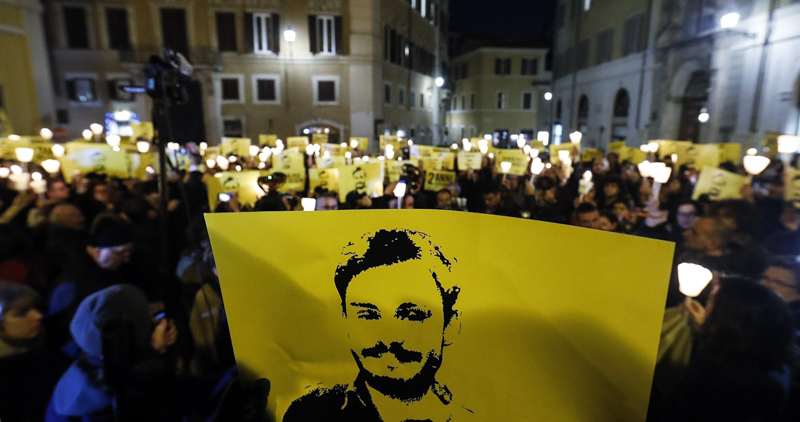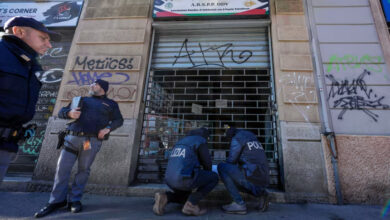
The Egyptian Public Prosecution and the Italian General Prosecution of Rome issued a joint statement on Monday regarding the latest developments in the 2016 killing of the Italian PhD student, Giulio Regeni, in Cairo.
The statement shows a stark contrast between the two countries regarding the fate of the investigation: Egypt’s Public Prosecution stated that it is going to temporarily shelve the investigation, while the Italian side intends to try five Egyptian suspects with links to Egyptian security agencies in court.
Egypt’s prosecution stated its rejection of its Italian counterpart’s decision to proceed with investigations, and again alluded to gang members as the responsible party for Regeni’s murder, stating that the office had evidence that he was at least robbed by them.
Regeni, a 28-year-old PhD student from Cambridge, had been conducting field research in Cairo regarding the independent trade unions in Egypt when he disappeared on January 24, 2016 in central Cairo, amid a high presence of police in the area who were anticipating protests.
Regeni’s body was found mutilated, bearing signs of torture, on a desert roadside on February 6, 2016.
Initially, Egyptian police officials suggested Regeni died in a road accident. However, an Italian autopsy showed that Regeni’s body was covered with cuts, and his bones were broken, indicating that he had been beaten with “fists, batons and hammers.”
Egypt has emphatically denied that its police were involved in Regeni’s abduction, torture, or death.
The Regeni case has strained ties between Egypt and Italy, which previously recalled its ambassador in Cairo over the case. Relations were restored in August 2017, when Rome said it would return its ambassador and continue the search for Regeni’s killers.
Given the circumstances, Egypt Independent has translated the full statement:
Within the framework of mutual and continuous judicial cooperation between the Egyptian Public Prosecution office and the Republic General Prosecution office in Rome over the past years, and after many meetings between the two sides, the most recent of which between the two investigation teams from the two prosecutions on October 28 in Cairo and November 5 in Rome, where each team presented to the other each its information and the results of the investigations into the incident, after the two parties exchanged views headed by the Egyptian Public Prosecutor and the Republic General Prosecution of Rome; they reached the following results:
First: The Republic General Prosecution of Rome announces its intention to conclude investigations into the incident by trying in court five individuals belonging to security services for their individual actions, without connection to any Egyptian governmental bodies or institutions, and submitting their case in accordance with Italian judicial procedures to the investigating judge in Rome for evaluation.
The Egyptian Public Prosecution, despite its appreciation of Italian legal procedures, nevertheless completely rejects this suspicion and does not support it; considering that there is a lack of firm evidence. The prosecution asserts its understanding of the independent decisions that will be taken by The Republic General Prosecution of Rome.
Second: The Egyptian Public Prosecution announces that it has found firm evidence that gang members committed the robbery against the victim, as his belongings were found at the residence of one of the gang members, and the testimonies of some witnesses supported this.
The investigations also revealed that the gang committed similar crimes in which the victims were foreigners; among which there is another Italian citizen, and that in committing their crimes, they used forged documents that falsely affiliated them with an Egyptian security agency.
Third: The Egyptian Public Prosecution affirms that the perpetrator of the incident of killing the victim student is still unknown, and that it will temporarily close the investigation, while instructing the search and investigation authorities to take all necessary measures to reach the perpetrator of the crime, and The Republic General Prosecution of Rome understands the decision of the Egyptian Public Prosecution.




